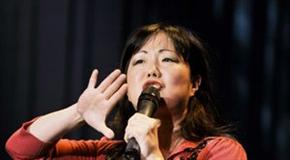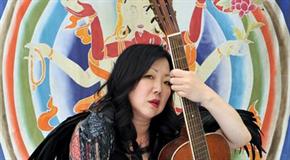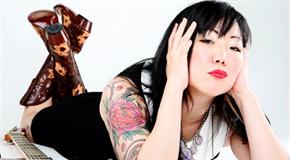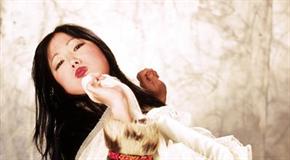Features
Margaret Cho Submits To The Q&A
One-liners, conceptual humor and a rabid wit represent only one side of the multi-talented artist. As an actress she starred in the ABC Television comedy “All American Girl” in 1994 and currently appears in “Drop Dead Diva” on Lifetime. Her credits also include appearances on television programs like “Ghost Whisperer,” “‘Til Death” and “Sex And The City” and her movie appearances include “Face/Off” and “17 Again.”
Cho’s upcoming CD, Cho Dependent, drops Aug. 24 and is comprised of humorous songs Cho wrote and performed with a wide range of musical artists, including Brendan Benson, Fiona Apple, Patty Griffin, Andrew Bird, Ben Lee, Ani DiFranco, Tegan and Sara, Grant Lee Phillips, Garrison Starr and Jon Brion. And, as if Cho isn’t funny enough by herself, Tommy Chong provides a few extra laughs.
Cho launches her “Cho Dependent” tour Aug. 15 in Provincetown, Mass. The very funny lady recently spoke with Pollstar about the CD, her experience working with musicians and her outlook on comedy.

On your new CD you’re accompanied by a list of artists ranging from Tegan and Sara to Fiona Apple to Ani DiFranco. What was it like to work with folks not necessarily known for comedy?
I’m not a very good musician. I can play many instruments – guitar, piano, banjo and dulcimer. However, I’m not a composer. I wanted to do an album like this for a long time, but I was in need of people who could write music with me, that could do it justice. I wanted to do a comedy album that was both funny but also had a lot of lasting merit, musically.
So I enlisted all these people, many of which are my dear and good friends. It started with Jon Brion, who is a tremendous musician, singer / songwriter and great producer. He and I wrote songs together. He taught me a lot of guitar chords and helped me out.
Everyone I approached to do it really thought it was a great idea and wanted to do it. I was very lucky.
How much did the artists contribute? For example, the track with Ani DiFranco – “Captain Cameltoe” – who came up with the title?
That was my title. I love Ani. I did a number of shows with her many years ago, and I had been a big, big fans for years. I wanted to do a song that was reminiscent of “Comic Strip” by Serge Gainsbourg. It was about a superhero, but tongue-in-cheek. Like it wasn’t really a heroic song but about a very practical, down-to-earth hero, which I think “Comic Strip” is. But you also have percussive elements – a person going “Pow! Kazoom! Blammo!” – which is not in the song.
So she wrote this great, bouncy musical element. We used a sample from Billy Martin of Medeski Martin & Wood. She built this great track and played all the instruments on it. We recorded the vocals in her amazing home studio in New Orleans. It was a great experience for me to hang out and record with her.

The song titles on the CD aren’t exactly radio-friendly, are they? It’s hard to imagine a radio DJ saying “here’s Margaret Cho with her latest hit, “Eat Shit And Die.”
There’s definitely a place for profanity in pop music. There always has been, and there’s a need for it. I definitely filled that, I hoped.
Are comedy albums a double-edged sword? Robin Williams, George Carlin and Steve Martin were just a few of the comedians that, after having hit albums, found audiences demanding what they heard on the recordings, and were not necessarily receptive to new material. Do you ever encounter that problem?
I think what is always a challenge to a comedian is that you have to do material that’s so much better than what you’ve done before, and the audience doesn’t care and forgets what you’ve already done. Even if they’ve seen you before, you have to constantly reinvent and make yourself better.
The way this CD is a little different is because it’s musical. There is this idea that the song is a joke, and when you go to see music, you want to hear them play the hits. Hopefully, there will be that too when I do these songs live.
I’ve put out a number of comedy albums and I haven’t felt like the audience is wanting to hear what they’ve heard before, just because I’m constantly trying to improve on what I did before.
What comedy albums did you listen to while growing up?
I had Richard Pryor’s. I had Steve Martin’s A Wild and Crazy Guy. Robin Williams’ Reality… What A Concept was an important album. I was a big fan of comedy albums.
Also the music of “Weird Al” Yankovic, who was a major influence on me while making this record as was listening to Dr. Demento on the radio. All the songs I heard on his program really helped form my idea of what comedy should be.

Is making a successful comedy album something of a lost art?
It is. It’s very old fashioned, but it’s coming back. It’s becoming very chic for younger comics, people who are starting off and want to have that very important first comedy album.
I’ve also seen a renaissance in comedy music, like Flight Of The Conchords and Tenacious D, making great music as well as great comedy.
How will you present the material on the new CD?
It’s going to take different forms. I’m inviting a lot of people who collaborated with me to come on the road with me and actually do the songs. Or I will perform to tracks, to retain the production. Or in different places, different bands. For me, it’s about retaining the integrity of the album, which is produced so beautifully that I just want to make sure it sounds great. I want it to sound like the record.
Do you have a concert rider – one of those contract additions spelling out your needs and desires?
Yes, but mine are very minimal. The artist eventually has to pay for that. It’s taken out of the check. I have the most basic rider. I like to go on the “Smoking Gun” website that lists the elaborate riders, like people asking for all-white dressing rooms.
To me, you’re there for such a limited time, why do you want to use your resources, why do you want to do that? For me, I just want some mints and water.
No joke requirements?
Sometimes there’s a different food on there, but it’s not really glamorous. I got to buy it, you know? I’m not really into making a big deal. I used to have Diet Coke on there. But it was too hard.
Is it easier for a female comedian now than when you started out?
I don’t know if it’s easier for women comics in general. It’s easier for me because I don’t think about it anymore. I’m performing on my own terms. When you’re on the road as much as I am, you go outside it [the comic community]. So I’m not that involved with it as I used to be.
In general I think it’s hard for women. There’s not the support that the guys have in terms of coming up and starting out. There’s more men in comedy. There always has been.
If your comedy persona was a rock band, which one would it be?
I would like to be like The Beach Boys – crazy fucked-up and unexpected, but beautiful. Like you want to retain a kind of mystery, legend and chaos a band like The Beach Boys would have. There are so many different mythologies, death and destruction. But at the same time there’s so much beauty.
I went through this phase where I listened only to The Beach Boys for two years. I just grew to appreciate all the nuances. People think it’s just surfing music but it’s so beyond all of that. It’s really American opera, American tragedy. I would like to be like The Beach Boys.

Is there any subject too taboo?
I don’t think so. On the album, even for me, there’s a lot of depth. There’s a song called “I’m Sorry” which I wrote with Andrew Bird, that deals with someone I was very in love with who broke my heart. I was in love with him for 17 years. I never Googled him because I didn’t want to find him happy, married with children, living in a lighthouse somewhere and super-successful.
I turned 40 and thought, “I still love this guy. I should find out where he is.”
I Googled him and his name came up. It said, “married screenwriter, producer, worked with Margaret Cho on “All American Girl.”
And in 2007 he was convicted of murdering his wife. He bludgeoned her to death and then stuck her in the attic for a month until she had partially mummified.
And I was so horrified. The fact that I had loved this person for 17 years, I was mortified at the tragedy. I felt so bad for this woman and her family. I was so upset. It could have been me, but it couldn’t be me. I couldn’t be that, I couldn’t even be murdered.
So I wrote this song with Andrew Bird because I was so upset, but also because I wanted to understand domestic violence. I think a lot of country music is about this. A lot of music I listen to is women dealing with domestic violence – Tammy Wynette, Etta James or Billie Holiday. That, to me, is the most taboo thing you can talk about – domestic violence, murder and bloodshed and the heartache that goes all around that.
I don’t think any subject is taboo. Certainly not for songwriting and certainly not for joke writing. Sometimes dark humor is the only way to rise above tragedy, and I think that’s the best way to look at it.
But it also takes a lot of skill for a comedian to take an audience on that journey. After all, they’re there to laugh.
Absolutely. Sometimes the darkest places is where we get the funniest material. Comedy and tragedy are two sides of the same coin, and that you have to be able to find a way through it. Sometimes humor is the only way to find salvation, so it is a level of skill.
The greatest songwriters to me are the darkest and funniest. People like Morrissey or Bob Dylan have so much grace and humor, but darkness in their writing. And that’s how try to approach songwriting.

Is it harder to be funny today than it was when you started your career?
Oh, yes. It’s because I’ve done so much. And part of being a comedian, is defining your self and there are literally so many ways or so many words to define your self. And you’re always trying to be better than before. It becomes more challenging. You’re always trying to do different things.
For me, I found a lot of help in music where it’s a different kind of writing. Even though it’s still comedy to me it’s more of an elaborate performance. It’s still very difficult. It’s a hard job.
Do you improvise while on stage or is it all planned out?
It’s all planned out. I’m not that much of an improviser although I have done it before. Sometimes you have to do it in live performance. It just happens and there’s no way around it. So yes and no. I don’t plan on it, but sometimes you can’t help it.
Do you have any one-liners reserved for hecklers?
I actually don’t have that problem. I haven’t had to deal with it. It’s better to deal with it in the immediacy of the situation and use the environment you’re in. It’s better to do that than rely on a stock answer. I think people can appreciate being in the moment than something that’s prepared. Generally if you just say, “Fuck you,” it works.”
Do you write all your stand-up material, or do you collaborate with someone?
I write everything. I would love to have a writer. I actually tried that before. People would come to see me, like comics, but afterwards say they can’t write for me. It’s too hard of a perspective. Maybe if there was another Asian-American woman who thought like I thought, it might work. I would love the help, but I haven’t had that.
As someone who writes her own material, what is it like for you when you’re in a TV show or movie and saying someone else’s lines, like in “Drop Dead Diva.”
I appreciate the show and I like it a lot. So it’s easy to step into the roll. It’s simple to do. You just walk over there and say that. Or what ever. For me, the acting thing is simple and easy to figure out. If you believe in the integrity of the story line and what they’re doing, then it’s not a hard thing to do. It’s a different way of working and thinking for me, but I really like it.
If you weren’t a comedienne, what would you be doing?
I’d be a veterinarian. I love animals. I have two dogs, which is a great joy. I think the connections people have to pets are sacred bonds. When it comes to animals I’m really good with them.
You’ve done a lot of press throughout the years. Is there anything no one has ever asked you?
No one has ever asked me about my favorite color. I’d have to say it’s royal blue.

Margaret Cho’s “Cho Dependent” tour begins with several dates at The Medeira Room / Vixen in Provincetown, Mass., Aug. 15-18 and 20-24. Then she heads to Portland, Ore., for a night at the Arlene Schnitzer Concert Hall Aug. 26; plays Seattle’s Paramount Theatre Aug. 27 and stops in Vancouver for a show at the Queen Elizabeth Theatre Aug. 28.
Other stops include Houston, Las Vegas, Phoenix, Anaheim, San Diego, Minneapolis, Boston, Montreal Washington, Los Angeles, Orlando, Miami Beach and just about every city where people need a good laugh.
For more information, click here for the Margaret Cho website.